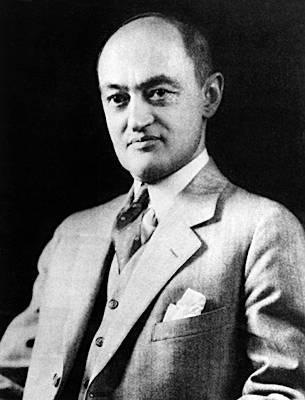Joseph Schumpeter (Joseph Alois Schumpeter)

Joseph Schumpeter was born in Triesch, Habsburg Moravia (now Třešť in the Czech Republic, then part of Austria-Hungary) in 1883 to Catholic German-speaking parents. His father owned a factory, but he died when Joseph was only four years old. In 1893, Joseph and his mother moved to Vienna. After attending school at the Theresianum, Schumpeter began his career studying law at the University of Vienna under the Austrian capital theorist Eugen von Böhm-Bawerk, taking his PhD in 1906. In 1909, after some study trips, he became a professor of economics and government at the University of Czernowitz. In 1911, he joined the University of Graz, where he remained until World War I. In 1918, Schumpeter was a member of the Socialization Commission established by the Council of the People’s Deputies in Germany. In March 1919, he was invited to take office as Minister of Finance in the Republic of German-Austria. He proposed a capital levy as a way to tackle the war debt and opposed the socialization of the Alpine Mountain plant. In 1921, he became president of the private Biedermann Bank. He was also a board member at the Kaufmann Bank. Problems at those banks left Schumpeter in debt. His resignation was a condition of the takeover of the Biedermann Bank in September 1924.
From 1925 to 1932, Joseph Schumpeter held a chair at the University of Bonn, Germany. He lectured at Harvard in 1927–1928 and 1930. In 1931, he was a visiting professor at The Tokyo College of Commerce. In 1932, Schumpeter moved to the United States, and soon began what would become extensive efforts to help central European economist colleagues displaced by Nazism. Schumpeter also became known for his opposition to Marxism and socialism that he thought would lead to dictatorship, and even criticized President Franklin Roosevelt’s New Deal. In 1939, Schumpeter became a US citizen. In the beginning of World War II, the FBI investigated him and his wife (a prominent scholar of Japanese economics) for pro-Nazi leanings, but found no evidence of Nazi sympathies. At Harvard, Joseph Schumpeter was considered a memorable character, erudite and even showy in the classroom. He became known for his heavy teaching load and his personal and painstaking interest in his students. He served as the faculty advisor of the Graduate Economics Club and organized private seminars and discussion groups. Some colleagues thought his views outdated by Keynesianism which was fashionable; others resented his criticisms, particularly of their failure to offer an assistant professorship to Paul Samuelson, but recanted when they thought him likely to accept a position at Yale University. This period of his life was characterized by hard work and comparatively little recognition of his massive 2-volume book Business Cycles. However, the Schumpeters persevered, and in 1942 published what became the most popular of all his works, Capitalism, Socialism and Democracy, reprinted many times and in many languages in the following decades, as well as cited thousands of times.
Joseph Schumpeter claimed that he had set himself three goals in life: to be the greatest economist in the world, to be the best horseman in all of Austria and the greatest lover in all of Vienna. He said he had reached two of his goals, but he never said which two, although he is reported to have said that there were too many fine horsemen in Austria for him to succeed in all his aspirations. Schumpeter died in his home in Taconic, Connecticut, at the age of 66, on the night of 7 January 1950. He was married three times. His first wife was Gladys Ricarde Seaver, an Englishwoman nearly 12 years his senior (married 1907, separated 1913, divorced 1925). His best man at his wedding was his friend and Austrian jurist Hans Kelsen. His second was Anna Reisinger, 20 years his junior and daughter of the concierge of the apartment where he grew up. As a divorced man, he and his bride converted to Lutheranism in order to marry. They married in 1925, but within a year, she died in childbirth. The loss of his wife and newborn son came only weeks after Schumpeter’s mother had died. In 1937, Schumpeter married the American economic historian Elizabeth Boody, who helped him popularize his work and edited what became their magnum opus, the posthumously published History of Economic Analysis.
Born
- February, 08, 1883
- Třešť, Czech Republic
Died
- January, 08, 1950
- USA
- Taconic, Connecticut
Cemetery
- Salisbury Cemetery
- Salisbury, Connecticut
- USA



